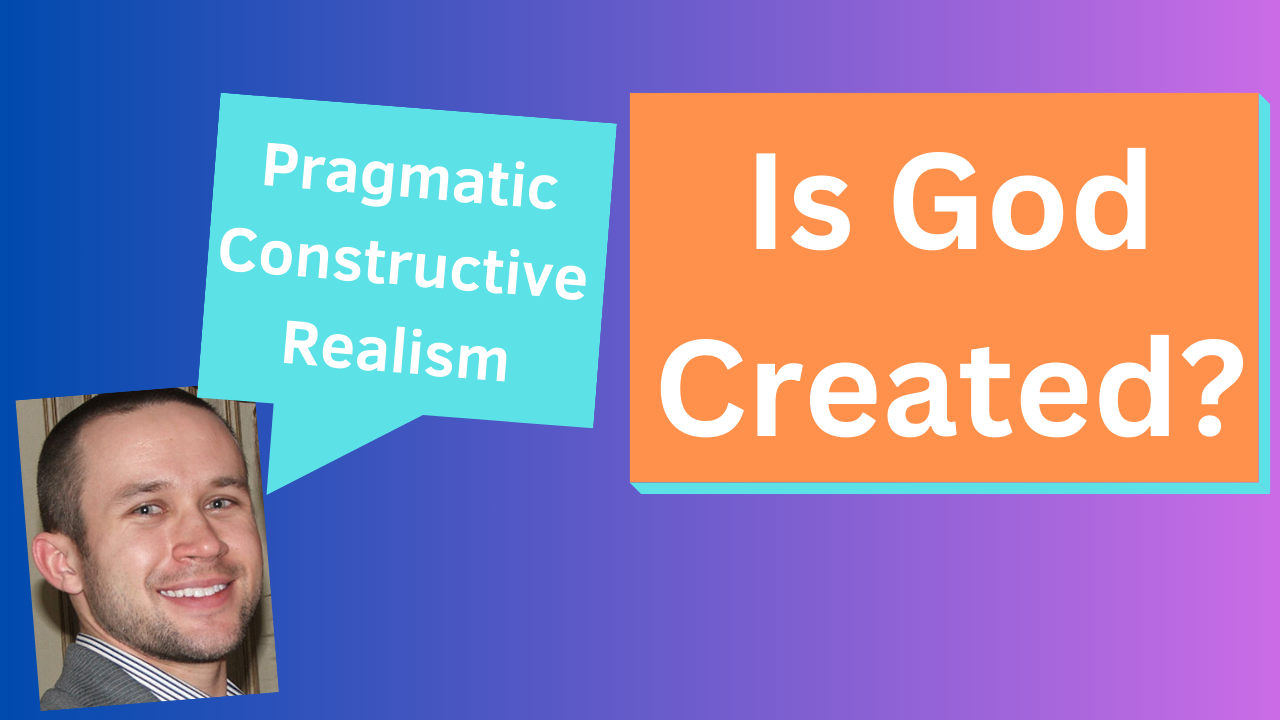09/27/2023 – Is God Created?

In between the long-standing debate between John Cobb and Robert Neville is Ben Chicka. Is God created? Chicka says...maybe? Check this out. This is TenOnReligion.
Hey peeps, it’s Dr. B. with TenOnReligion. If you like religion and philosophy content one thing I really need you to do is to smash that sub button because it really helps out the channel. The transcripts are available at TenOnReligion.com and new episodes are posted about every two weeks, around noon, U.S. Pacific time, so drop me some views.
I actually feel like I’m having a bad hair day… as if that’s even possible… Ben Chicka is a philosopher theologian that I’ve met a few times at academic conferences – pretty cool dude – and he recently released a book titled, God the Created. It lays out a position which he calls pragmatic constructive realism, or PCR. His view is heavily influenced by the American pragmatist, C. S. Peirce. Chicka frames his view in the middle of the debate between two great American theologians, Robert Neville and John Cobb. We’re going to set up the problem, give some info about Peirce, and then try to explain this long-standing debate between Cobb and Neville. After that, we’ll see where Chicka stands in all of this. Let’s get started.
Chicka asks, what is truth if nothing stable can be referenced? Any claim is approximately true, limited, and open to correction because truth claims are determined in relation to changing historical circumstances. Realism in philosophy roughly means that objects and their properties exist, and they exist independently of what anyone thinks about them. Constructivism in philosophy roughly means that we understand objects, at least in part, based on our own categories and interpretation of them. A more extreme version of this comes from Berkeley who held the view that objects didn’t exist without us perceiving them. This gets into the issue of what does existence amount to. But let’s get back to religion for a minute, and more specifically, theology. Karl Barth’s entire theology was based on the idea that religious identity is entirely based on a narrative, that of the Bible. This was contrasted with Paul Tillich who held the view that many things influence not only our understanding of Christianity, but also the Bible itself and its understanding over time. Barth neglects the fact that money, politics, and other forces in society have significantly shaped both the texts themselves and how people have understood those biblical texts. For example, Greek epics like the Iliad and the Odyssey, along with works from Greek philosophers like Plato, have greatly influenced most New Testament documents because these works were used in teaching New Testament authors how to read and write Greek. The big question here is – is God a separate entity from humans, or have humans somehow understood God through their own categories of understanding and interpretation over the centuries?
Enter Charles S. Peirce, often referred to as the father of American pragmatism. Unlike British empiricists such as Hume who held skepticism in such high regard, Peirce values fallibilism, the idea that beliefs can be mistaken, but realizing that fact is an invitation to correct mistaken judgments rather than be pessimistic about our ability to know anything. All beliefs are formed on the basis of limited evidence. Peirce rejects three things: what he calls tenacity – my way or the highway regardless of any counterevidence, authority – the imposition of religious and political control over everything else, and an a priori view whereby opinion is settled through reason instead of social control. All three reveal nothing about the nature of reality. Tenacity holds on to a beloved narrative. Authority tries to enforce a narrative through power. An a priori view is not even interested in checking its claims with reality. Knowledge for Peirce is constructed and reconstructed when experience of the real world forces the revision. Truth and meaning are found through interpretation at specific times and places. Different understandings of reality will emerge as time and place change. To aid in understanding how this works, Peirce developed a theory of signs and a theory of categories. The theory of signs includes an icon, an index, and a symbol. Icons relate to objects in terms of likeness. Indices relate to their objects directly indicating what caused them. Symbols have their relation to objects determined by specific characters they are given for general use. An example of a symbol would be a red traffic light which relates to the general idea of stopping. The theory of categories includes Firstness, Secondness, and Thirdness. Firstness is the quality of being in itself. Secondness reveals the existence of such objects. Thirdness relates to knowing those objects. The theory of categories is especially important for Chicka’s view. More on that in a minute. Lastly, on Peirce’s view there is continuous connection, meaning the past is only relatively definite because what emerges from it can give it new character. The past continues to be understood differently as one moves forward in time because humans through culture create different categories of understanding which changes their understanding of the past. That’s Peirce. Now on to the debate.
John Cobb and Robert Neville have been debating for decades in their writings and at various events. Cobb’s view emphasizes immanence over transcendence. Worldviews dialogue with each other so they can be creatively transformed, with Christianity somehow taking precedence in all of that. Cobb is heavily influenced by Whitehead’s process philosophy. It’s based on a vision in which relations are the locus of reality, and creativity, not form, is the absolute standard by which meaning is found. Everything is in process. What are labeled as “occasions” are constantly in the process of becoming concrete. Some possibilities are actualized and some are unrealized. For Cobb, God is some sort of container for all these possibilities. Creativity is the ultimate reality actualized in the activities of actual occasions. It’s a dynamic, not static, process whereby God and the world are constantly undergoing experience. They are not the same thing but are co-dependent on one another. In Cobb’s view, God, the world, and creativity are separate, and thus they become the three ultimates in his system.
Neville’s view emphasizes transcendence over immanence. He holds a more comprehensive worldview taking into consideration philosophy, science, and religious traditions, with an indeterminate grounding for it all. Cosmological questions take a back seat to ontological questions. God is an indeterminate act and the determinate world is the expression of God’s creative act. There is no sense talking about God before creation on Neville’s account. Neville’s indeterminate creator God is the most ultimate ontological structure explaining the basic features of reality. This God is in tension with many aspects of actual religious communities, insofar as they use immanent and personally meaningful religious images rather than always deferring to God’s otherness. Given that anything determinate can only insufficiently express God, finite/infinite contrasts and broken symbols dominate Neville’s work. All religious symbols are broken because they point to, but do not literally depict, the God engaged in their usage. The paradox in Neville is that for an indeterminate God to be engaged and worshipped, material or concrete things and ideas are necessary. The determinate, or finite expressions of God, are broken because, at best, they can only be metaphorical. But these religious symbols are still very important and work best when they are sufficiently consistent with knowledge about the world from other areas such as science or philosophy. This makes a religious tradition more plausible, and thus more acceptable or believable.
Chicka really frames his view in relation to the Cobb/Neville debate so that’s why it’s important to understand the similarities and differences. Cobb and Neville have broad areas of agreement. Theology is metaphysical not simply narrative, fallible not foundational, consistent with other knowledge about the world, and pluralistic not imperialistic. But Cobb speaks of contexts and Christian natural theology. Neville speaks of contexts only when it comes to symbolic engagement and provides a philosophical theology relevant to all world religions. Neville rejects the concept of a divine being and instead argues that God is indeterminate, a result from focusing on a transition from nonbeing to being in the divine creative act. Cobb, unsatisfied with substance theism, modifies theism to fit the data. Neville is also unsatisfied with substance theism but makes a move opposite that of Cobb in response. Rather than modifying theism to fit the data, he makes a new creative hypothesis for the sort of God responsible for the world.
So, what about Ben Chicka and pragmatic constructive realism, or PCR? Is God “created” as his book title indicates? In Chicka’s assessment, Neville’s argument for God’s indeterminacy is satisfying. But where Neville falls short is in thinking he does justice to the transcendence and presence of God. Neville has difficulty affirming God’s immanent determinate character because any determinate claim about God can only be a broken symbol. In Chicka’s view, in order to fully affirm both the transcendence and immanence of God the creator, God must also be understood to be determined by the world resulting from the divine act. God the creator is also created by the world. This is where PCR comes in. PCR maintains that we are driven by existing commitments and yet constructive in creatively making sense of new data through novel interpretations of reality. What makes PCR pragmatic constructive realism rather than simply the realism or constructivism described earlier, is that human strivings, our constructions with language, are a necessary part of reality. Divine creation remains real, but we have an active role in bringing created possibilities to completion. The connection between an indeterminate God and a God in process is the connection between Peirce’s Firstness and Thirdness, in which we have an active role. Theology cannot start with the assumption of God and read that assumption into the world. It cannot privilege Barthian narratives over empirical facts. In fact, it must begin with empirical facts. But rather than quickly fleeing to God and the transcendent realm, the move to God must be earned. Cultivated religious symbols, rather than being necessarily broken in this alternative view, are related to the vague cosmic possibilities of Firstness and their deeper ontological ground. Symbols of God are not broken as much as they are growing, shifting, and adapting. God the creator is absolute Firstness. The terminus of that act, God fully revealed, is absolute Secondness. The universe at any point measured, humanity’s cultivated reactions to that God found in the world’s religious traditions, is Thirdness. By reason (P) we interpret (C) reality (R). Pragmatic constructive realism. There can be both a real world and constructed meanings we bring to it and by which we make it intelligible. And there you have it!
What do you think? That was great stuff, no? Do you think Chicka’s pragmatic constructive realism is a better way to understand God? Or do you prefer Cobb or Neville’s view instead? Leave a comment below and let me know what you think. In the next episode we’re going to get into something that’s been bothering me for a while and that is some Christians who recently are using, or rather, misusing, the word “deconstruction.” I’m sure it’ll be fun to hear me rant. Until next time, stay curious. If you enjoyed this, support the channel in the link below, please like and share this video and subscribe to this channel. This is TenOnReligion.
Benjamin J. Chicka, God the Created. Albany, NY: SUNY Press, 2022.


